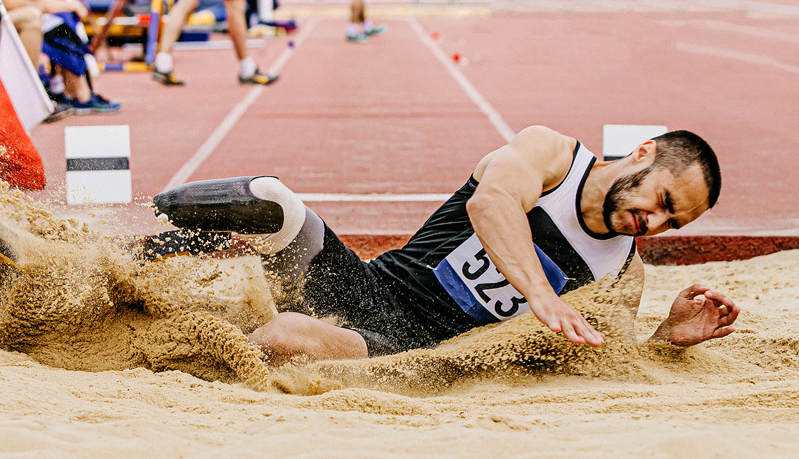
Superhuman efforts by the some of the world’s fittest and ablest bodies riveted our attention on the Paris Olympic Games in recent weeks. These coming days, the Paralympic Games will bring us more athletic feats, this time performed by the heroic efforts of those living with disabilities. They are declaring to the world that social value and human dignity are not rooted in physical perfection.
The story of the Paralympics begins on Kristallnacht, 9 November, 1938, when the antisemitic Nazis attacked Jewish people and properties in Germany. The director of the Jewish hospital in Breslau was a German Jew named Dr Ludwig Guttmann (1899–1980), who ordered his staff to admit anyone without question. When the Gestapo inspected his hospital the next morning, he had to justify every new admission. He managed to rescue 60 patients, only four being deported to concentration camps.
Early in 1939, Nazi persecution of the Jews forced Guttmann and his family to flee to England. There he continued research he had begun in Germany into spinal injuries, at the Nuffield Department of Neurosurgery in Oxford. Guttmann was horrified to see how patients were often put in casts and then neglected, dying within short periods from bed sores.
The war that broke out later that year was to result in countless spinal injuries. In September 1943 the British government asked Guttmann to establish Britain’s first specialist unit for treating spinal injuries at Stoke Mandeville Hospital in Buckinghamshire. The unit opened in February 1944 with Guttmann as director, a firm believer that sport was a major method of therapy, helping those with injuries to rebuild strength and self-respect. He became a naturalised citizen of the United Kingdom in 1945.
Paralympics
Preparations for the first post-war Olympics in 1948 in London inspired Guttmann to organise the first Stoke Mandeville Games for disabled war veterans on the opening day of the Games, 28 July 1948.
Four years later, Dutch veterans joined British competitors making it the first international competition of its kind. As the event continued to grow, it caught the attention of the Olympic Games organisers. At the 1956 Stoke Mandeville Games, the International Olympic Committee awarded Dr Guttmann the Sir Thomas Fearnley Cup for promoting social value and human dignity through wheelchair sports.
At the Rome Olympic Games in 1960, the International Stoke Mandeville Games were held alongside the official XVII Olympiad, realising Guttmann’s dream to to create an elite sports competition for people with disabilities, equivalent to the Olympic Games. Four hundred athletes from 23 countries competed in these 1960 Games, no longer open solely to war veterans. These are now recognised as the first ‘Paralympics’, although the term was retroactively applied by the International Olympic Committee in 1984.
In 1966 Queen Elizabeth knighted Dr Guttmann to become Sir Ludwig. He died in the year of the Moscow Olympics, 1980.
Since Rome, the Paralympic Games have taken place in the same year as the Olympic Games. While initially open only to those in wheelchairs, at the 1976 Summer Games, athletes with different disabilities were included, expanding participation to 1600 athletes from 40 countries. Since the Seoul Games in 1988, the Paralympics have been held directly after the Olympics, using the same facilities. At the Paris Games, 184 nations will be competing in 549 events covering 22 sports.
Disability network
The Paris Paralympics bring to our attention many more heroic stories of those who have overcome great odds of living daily with handicaps, as well as of those who commit their lives to give the disabled a sporting chance.
Two heroes my wife and I admire are Thérèse Swinters and Martina Köninger, who have networked faithfully across Europe for decades on behalf of the 70 million disabled Europeans. Thérèse, an infectiously-positive disabled-from-birth Belgian, was convenor of the European Disability Network, a task now carried by Martina, disabled in a car accident when engaged to be married. Martina is now wife and mother of two. They have made us aware of the many challenges facing disabled folk, including an all-too-pervasive indifference and ignorance within the Christian community.
Last October I talked with them about the challenges and opportunities the disabled community faces when personhood and humanness are being separated.
They have pointed me to the activities of Ensemble2024 launched across Paris and France parallel to the Paralympics. These include the ongoing Holy Games mobilizing Catholic believers to celebrate through sport the eminent dignity of the human person and the call for fraternity between peoples, and to promote opportunities for the most vulnerable, especially the most disadvantaged, in keeping with the Olympic motto: Faster, higher, stronger—together.
News reports of the Paralympics can help us reflect on the heroic stories behind each of the competing athletes who have refused to allow disability to prevent them reaching out to their potential.
Originally published by Jeff Fountain's Weekly Word. Republished with permission.
Jeff Fountain and his wife Romkje are the initiators of the Schuman Centre for European Studies. They moved to Amsterdam in December 2017 after living in the Dutch countryside for over 40 years engaged with the YWAM Heidebeek training centre. Romkje was founder of YWAM The Netherlands and chaired the national board until 2013. Jeff was YWAM Europe director for 20 years, until 2009. Jeff chaired the annual Hope for Europe Round Table until 2015, while Romkje chaired the Women in Leadership network until recently. Jeff is author of Living as People of Hope, Deeply Rooted and other titles, and also writes weekly word, a weekly column on issues relating to Europe.





